Scaling the legendary Island Peak while trekking to the iconic Everest Base Camp offers an unparalleled Himalayan adventure. This exhilarating journey takes adventurers through the heart of Sagarmatha National Park, immersing them in the rich Sherpa culture and awe-inspiring landscapes. Participants will acclimatize and prepare for the challenging Island Peak ascent, which rewards climbers with stunning panoramic vistas of the world’s highest peaks. With a professional team guiding the way, this expedition provides a unique opportunity to push personal boundaries and witness the majestic grandeur of the Himalayas. What awaits those who embark on this epic journey is a profound sense of accomplishment and lifelong memories.
Key Points
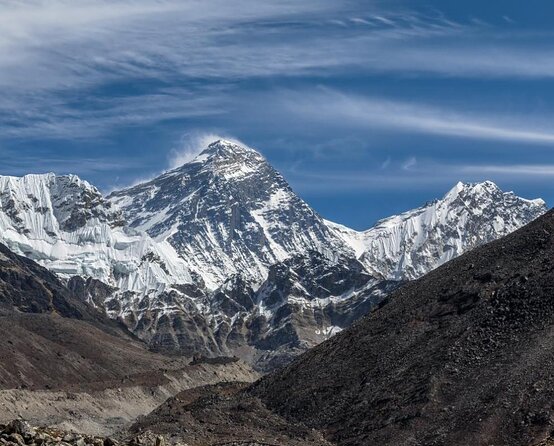
- The Island Peak climbing expedition includes a trek to the iconic Everest South Base Camp, providing breathtaking views of the Himalayan peaks.
- Climbers face a challenging ascent of Island Peak at 6,160 meters, requiring technical mountaineering skills and endurance.
- The journey begins with a scenic flight from Kathmandu to Lukla, the gateway to the Khumbu region.
- Trekkers explore the stunning landscapes of Sagarmatha National Park, a UNESCO World Heritage Site, encountering Sherpa villages and monasteries.
- The expedition offers comprehensive inclusions, such as meals, accommodations, flights, and insurance, providing exceptional value for the unparalleled Himalayan experience.
Overview and Highlights
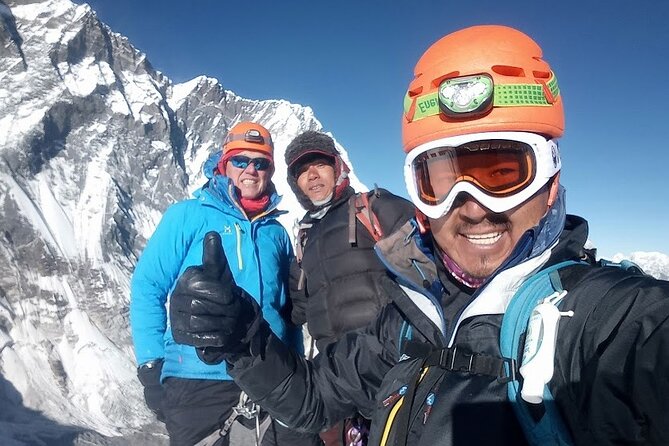
Island Peak Climbing is a thrilling high-altitude trekking and mountaineering adventure in the Everest region of Nepal.
At 6,160 meters, Island Peak offers stunning views of snow-capped peaks, including the mighty Mount Everest.
The journey involves a scenic flight from Kathmandu to Lukla, followed by a trek through the UNESCO-listed Sagarmatha National Park, home to traditional Sherpa villages and monasteries rich in Buddhist culture.
Trekkers can explore the renowned Everest South Base Camp and witness the awe-inspiring Khumbu Ice Falls before attempting the challenging climb to the summit of Island Peak, providing an unparalleled Himalayan experience.
You can also read our reviews of more tours and experiences in Kathmandu.
Itinerary Breakdown
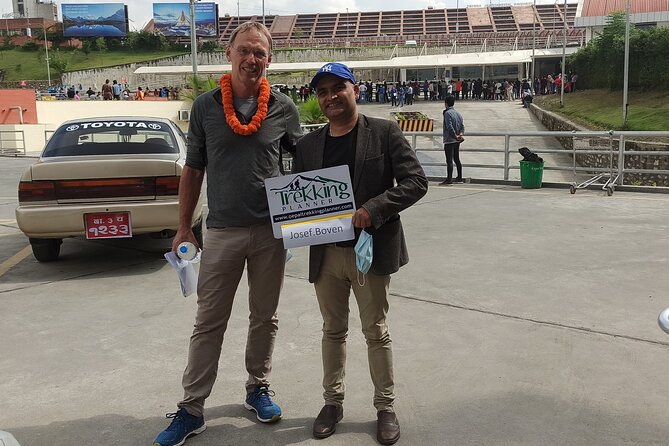
The Island Peak climbing expedition begins with a flight from Kathmandu to Lukla, which provides a stunning aerial view of the snow-capped peaks that dominate the Himalayan landscape.
Trekkers then hike through the picturesque Sagarmatha National Park, a UNESCO World Heritage Site, stopping at traditional Sherpa villages and monasteries along the way.
Acclimatization days are built into the itinerary to ensure a safe and successful climb.
The route includes the iconic Everest Base Camp, where climbers can witness the majestic Khumbu Ice Falls.
After reaching the summit of Island Peak at 6,189 meters, the team retraces their steps back to Lukla for the return flight to Kathmandu.
Inclusions and Exclusions
The island peak climbing expedition includes various essential components, such as meals, accommodation, and flights. The included offerings feature breakfast, lunch, and dinner in Kathmandu and during the trek, as well as lodges along the trek route and camping at Island Peak. Plus, the package covers round-trip flights between Kathmandu and Lukla. Travelers will also receive personal travel, health, and emergency evacuation insurance coverage.
| Inclusions | Exclusions |
|---|---|
| Meals | Visa fees |
| Accommodation | International airfare |
| Flights | Personal expenses |
| Additional activities |
The comprehensive offering is complemented by a few exclusions, including visa fees, international airfare, personal expenses, and any additional activities.
Physical Requirements
To embark on the Island Peak climbing expedition, a moderate level of physical fitness is required.
The trek involves long days of hiking through rugged terrain, reaching high elevations of over 6,000 meters. Participants should be comfortable with steep ascents, uneven paths, and navigating through glaciers and snow.
While no mountaineering experience is necessary, a good level of endurance and stamina is essential. The climb itself, though non-technical, requires the use of ropes, crampons, and other climbing equipment.
It isn’t recommended for individuals with any mobility issues or pregnant travelers, as the physical demands can be challenging.
The tour is designed for private groups, ensuring a personalized and supported experience throughout the expedition.
Reviews and Pricing
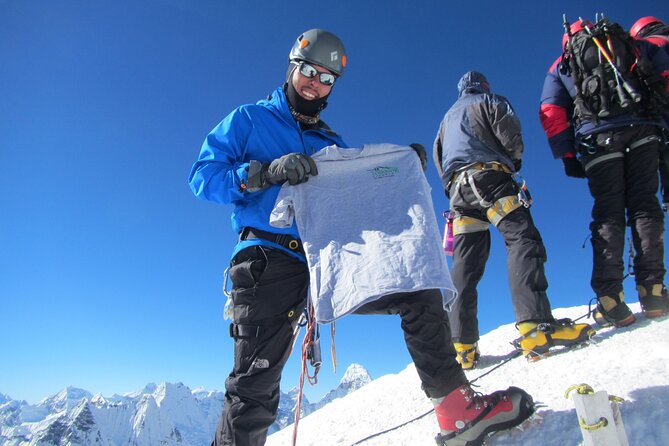
As of recent, the Island Peak climbing expedition has amassed an impressive 5.0 out of 5 rating across 4 reviews, showcasing its exceptional value and customer satisfaction.
The starting price for this adventure is $2,899.00, with the flexibility of free cancellation up to 24 hours before the experience begins.
Some key highlights regarding the pricing and reviews include:
- Comprehensive inclusions such as meals, accommodations, flights, and insurance.
- Exclusions limited to visa fees, international airfare, and personal expenses.
- Highly rated by previous participants for its exceptional value and unforgettable experience.
- Flexible cancellation policy, allowing for last-minute changes in plans.
Flight to Lukla
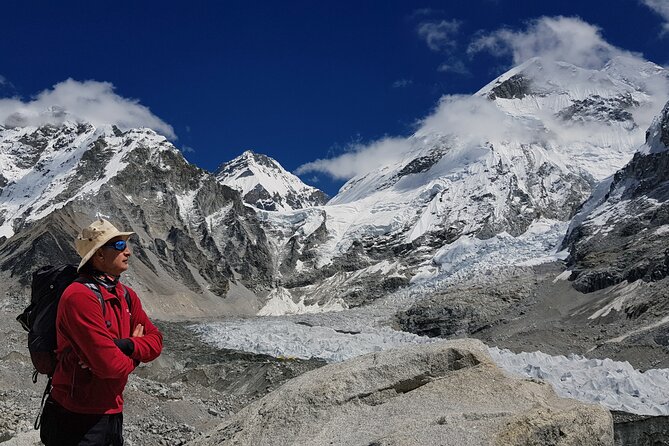
Departing from Kathmandu, the scenic flight to Lukla marks the start of the Island Peak climbing expedition.
Flying through the Himalayas, the 35-minute journey offers breathtaking views of snow-capped peaks, including Mt. Everest.
Lukla, the gateway to the Khumbu region, is home to a tiny airport nestled amidst the mountains.
Disembarking at this high-altitude airstrip, trekkers begin their journey towards Island Peak, passing through traditional Sherpa villages and the iconic Sagarmatha National Park, a UNESCO World Heritage Site.
The flight sets the tone for the adventure ahead, immersing participants in the stunning natural beauty of the Everest region before the challenging trek begins.
Trekking in Sagarmatha
From Lukla, trekkers embark on a journey through the stunning landscapes of Sagarmatha National Park, a UNESCO World Heritage Site renowned for its diverse flora, fauna, and rich Sherpa culture.
Along the trek, they’ll encounter:
-
Enchanting Sherpa villages, where they can enjoy the local way of life and visit ancient Buddhist monasteries.
-
Breathtaking views of snow-capped peaks, including the majestic Mount Everest, as they ascend the trails.
-
Opportunities to spot rare wildlife, such as the elusive Himalayan musk deer and the iconic Himalayan black bear.
-
Challenging high-altitude terrain that tests their endurance and adaptability, ultimately leading them to the iconic Everest South Base Camp.
Summit Island Peak
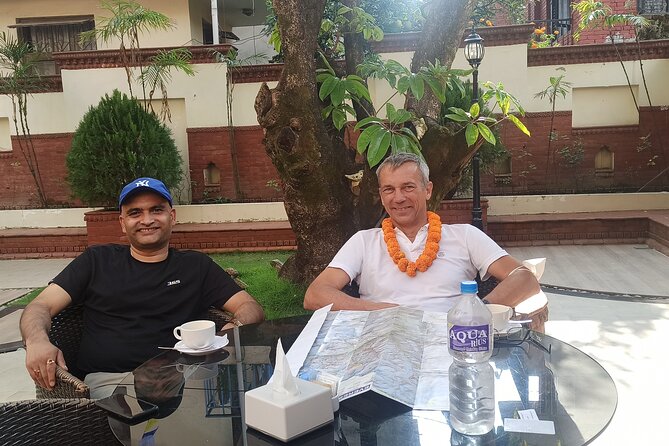
Climbers embark on a challenging trek to reach the summit of Island Peak, a 6,160-meter (20,210-foot) mountain in the Himalayas. The final push to the summit tests their endurance and mountaineering skills, as they navigate steep, technical terrain. Upon reaching the top, climbers are rewarded with awe-inspiring views of the surrounding Himalayan giants, including the majestic Mount Everest. The descent can be just as demanding, requiring careful navigation and coordination. Throughout the expedition, climbers gain a deeper appreciation for the power and beauty of the Himalayas. The summit of Island Peak is a true mountaineering accomplishment and a highlight of any Everest Base Camp adventure.
| Elevation | Terrain | Duration | Difficulty |
|---|---|---|---|
| 6,160 m | Steep, technical | 9 hrs | Challenging |
Frequently Asked Questions
What Is the Best Time of Year to Climb Island Peak?
The best time to climb Island Peak is typically from March to May and September to November when skies are clear, temperatures are mild, and conditions are optimal for the challenging ascent up to the 6,160-meter summit.
What Is the Success Rate for Summitting Island Peak?
Based on industry data, the summit success rate for Island Peak is around 70-80%. Factors like weather, acclimatization, and guide experience can impact the chances of reaching the 6,160m peak. Proper preparation and a competent guide are key to maximizing one’s odds of summiting Island Peak.
What Level of Mountaineering Experience Is Recommended for Island Peak?
Moderate mountaineering experience is recommended for climbing Island Peak. Climbers should be comfortable with technical glacier travel, using crampons and ice axes, and have prior experience with high-altitude trekking and camping. Proper acclimatization is crucial for success on the peak.
What Is the Typical Group Size for an Island Peak Expedition?
Typically, Island Peak expeditions have a group size of 4-10 participants. The small group size ensures personalized attention and a more intimate trekking experience amidst the stunning Himalayan landscapes.
Are Permits Required to Climb Island Peak, and How Do I Obtain Them?
Climbing permits are required to ascend Island Peak. Climbers must obtain a permit from the Nepal Ministry of Tourism and Civil Aviation prior to the expedition. The permit cost varies depending on the size of the climbing group.
Recap
The Island Peak Climbing with Everest Base Camp trek offers a once-in-a-lifetime opportunity to explore the majestic Himalayas. Trekkers can enjoy the region’s rich culture, witness the grandeur of Mount Everest, and challenge themselves by summiting the 6,160-meter Island Peak. This adventure-filled journey is a perfect blend of scenic landscapes, cultural experiences, and personal accomplishment.
More Tour Reviews in Kathmandu
Not for you? Here's more things to do in Kathmandu we have recnetly reviewed
- 2 Best Guided Tours In Jagat
- 20 Best 2 Day Tours In Kathmandu
- 20 Best 3 Day Tours In Kathmandu
- 20 Best 4 Day Tours In Kathmandu
- 8 Best Dining Experiences In Kathmandu
- 20 Best Full-Day Tours In Kathmandu
- 25 Best Helicopter Flights And Tours In Kathmandu
- 25 Best Helicopter Flights And Tours In Kathmandu
- 13 Best Massage And Relaxation Services In Kathmandu
- 5 Best Photography Experiences In Kathmandu
- 8 Best Dinner Tours In Kathmandu
- 17 Best Lunch Experiences In Kathmandu
